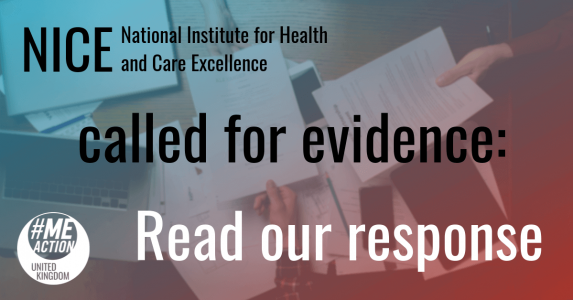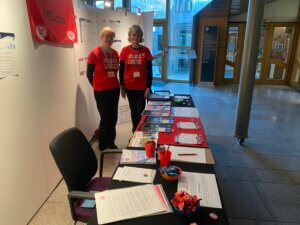The National Institute for Health and Care Excellence (NICE) are re-writing their guidelines on ME. As part of this they issued a call for evidence relating to three topics. #MEAction UK has now submitted our full response, collecting studies, surveys and data from multiple sources.
[maxbutton id=”23″ url=”http://www.meaction.net/wp-content/uploads/2019/10/MEAction-submission-to-the-NICE-ME-CFS-call-for-evidence-consultation.pdf” text=”Read the full submission” ]
#MEAction UK also wrote, circulated and analysed the results of a survey, relating to ME services in the UK, that we have submitted as part of this response. Read more about the survey and its results below.
[maxbutton id=”15″ url=”http://www.meaction.net/wp-content/uploads/2019/10/Your-experience-of-ME-services-Survey-report-by-MEAction-UK.pdf” text=”Read our survey analysis” ]
The three areas NICE were asking for evidence were:
- Management strategies that are adopted while someone is being assessed for a diagnosis of ME/CFS.
- Methods of monitoring and/or reviewing people with a diagnosis of ME/CFS
- Evidence on the experience of people who have had interventions for ME/CFS.
NICE also specified the evidence they were able to accept, including “systematic reviews, randomised controlled trials, non- randomised trials that are prospective or retrospective cohort studies will be considered for inclusion in the guideline. We cannot accept non comparative studies, promotional material, non-evidence-based assertions of effectiveness or opinion pieces”. Furthermore, “qualitative studies evaluating focus groups and interviews and surveys will be considered for inclusion in the guideline. We cannot accept case series, case studies, individual accounts of experience, promotional material, non-evidence-based assertions of effectiveness or opinion pieces”.
In putting together this submission we decided to be fairly liberal in what we included, agreeing that it was better for us to submit evidence that pushed the boundaries of what they state they are willing to accept, than for NICE not to receive it at all.
Our full response totals 111 studies, surveys and trials. It includes 19 studies demonstrating exercise leads to abnormal physiological responses in people with ME.18 surveys of people with ME, and one meta-analysis of surveys demonstrating the harms of GET and ineffectiveness of CBT. And more on impaired cognitive functioning, early mortality, monitoring of children with ME, comorbidities and common but under-investigated symptoms.
Evidence for this submission was gathered from advocates at #MEAction, from past submissions we’ve made to NICE, from Science for ME, from the ME community sending in evidence they wanted to be included and from reaching out to other organisations across the world. Thank you to all those who put forward suggestions.
This submission is a long way from being a fully comprehensive overview of the research base, however we hope it brings some evidence to the attention of NICE that could have been missed and reinforces that the current paradigm of treatments, especially graded exercise therapy (GET) and cognitive behavioural therapy (CBT), are failing people with ME.







2 thoughts on “NICE Called for Evidence: Read #MEAction UK’s Response”
I’m praying for a miracle that NICE actually responds responsibly and promotes real help, both medically and pastorally, for my 3 adult children, my eldest sister and the oh so many invisible, horribly afflicted people worldwide that struggle with this dreadful condition!
Please help us with this. There are millions of people who are suffering from ME /CFS.
Comments are closed.